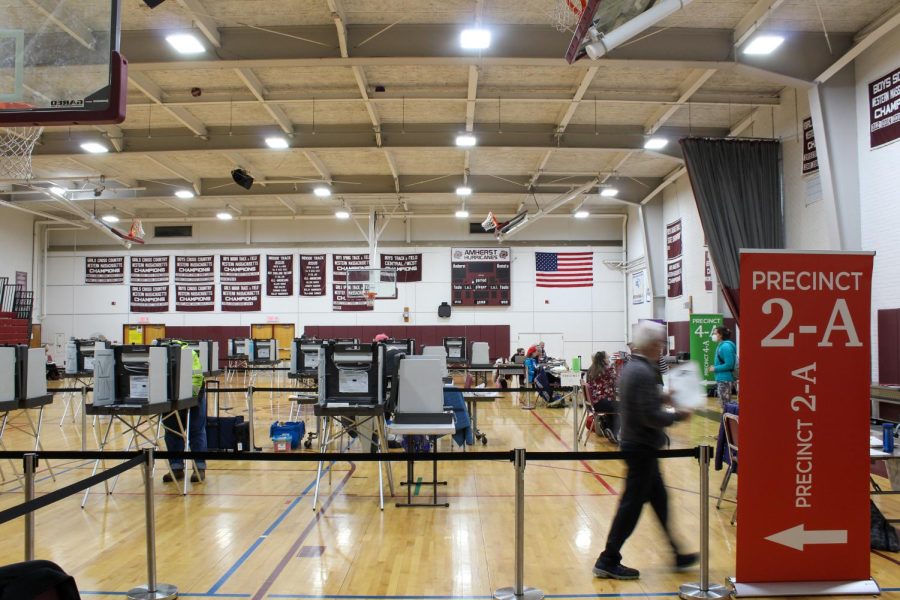Voters arrived at the polls on Nov. 8 to cast their ballots for governor, weigh in on ballot measures and fill seats in the state legislature. Polls in Amherst were quiet with waves coming during the early morning and in the evening after work.
Midterm election results are being closely watched around the country with reports on concerns of voter fraud and uncertainty about which party will gain Senate majority.
“There’s a lot of tension around [voting],” said Jim Ballard, an Amherst resident, “I didn’t feel it here today, but I’m reading about it.”
Poll workers efficiently and calmly directed the steady trickle of voters throughout the day. In Amherst, there are five districts divided into 10 total precincts. Residents have the choice of seven polling locations to cast their ballot.
As of Nov. 8, Amherst has received 4,527 mail-in ballots and 29 absentee ballots, according to Town Clerk Susan Audette. Audette noted that 14,505 residents were registered voters, making up about 31 percent of Amherst’s population as of November 2022.
District 5-A Warden Nancy Wilson coordinated the voting process at Bangs Community Center. “I would say there’s a big increase in mail-in ballots,” Wilson said. “A lot of people still really like to vote in person.”
Amherst voters leaving the polls noted that questions two and four were at the forefront of their minds. Many chose to vote in-person out of tradition, such as Amherst residents Verena Smith and Ballard.
Amherst residents Anika Lopes, Debora Bridges and Shirley Jackson Whitaker were advocating for their organization Tote2Vote. Whitaker and Lopes started the initiative to increase voter registration and combat voter suppression.
“Freedom and democracy,” brought Lopes to the polls today. She was carrying a tote from her organization with registration information that she has distributed throughout the day.
Whitaker recalled growing up in southern Georgia and watching her mother struggle because of racially biased voter suppression tactics. “When she got the opportunity to vote I remember that early one morning I saw her getting dressed fancy. I said, I knew it wasn’t Sunday and nobody was dead, ‘Why are you getting dressed?’”
She remembered her mother responding, “I’m going to vote. And when I walk in there I want them to know that I’m somebody.”
All three women were dressed elegantly in bright colors and accessorized with felt hats and vibrant tote bags.
Whitaker and Lopes said that their hats were in honor of Whitaker’s mother and Black women’s experience in the south. “We did Tote2Vote as part of that and the hats [in order to] remember all our ancestors who…didn’t let someone stop them and they kept fighting,” Whitaker said.
“There’s something for me about participating [in person] …People died to give me this chance,” Whitaker said.
For others, it was their first-time voting. UMass students Grace Fuller, sophomore biology major, and Hallie Farmer, freshman biochemistry major, both agreed that they wanted to cast their first ballots in-person at the polls.
“I wanted to do in-person [voting] because I feel like, if it’s like not in-person then I’m going to forget about it…I know exactly what I did and I didn’t do anything incorrectly.” Farmer liked the confidence that came from seeing her ballot physically counted.
Farmer took time to educate herself and research candidates before arriving at the polls. She also went to Amherst’s town hall to inquire about her precinct.
Farmer said some of her friends struggled with the voting process because of the demands and schedule of being a full-time student. Other students were unable to register to vote in Amherst and struggled to source a mail-in ballot.
“When you think of all the factors, like grades, trying to get through student loans…friendships, relationships and everything going on at once,” she said.
The demand of schoolwork and not knowing where to vote are challenges college students face. “It’s hard to get [the significance of voting] in people’s minds when they have so many other things to worry about,” Farmer said.
“One of the things that we notice a great deal in a town with a lot of students is that they don’t realize that they have to register in the town that they plan to vote in,” Wilson said. “So we get a great many students coming in thinking that they’re registered in another town and they can vote here…Voter education is crucial if we’re going to get students to vote.”
Amherst polling stations were an example of residents performing their civic duty and community volunteers coming together to orchestrate a smooth democratic practice.
“The democratic process is this: It is human beings voting, human beings … volunteering sometimes in the Town Clerk’s office,” Wilson said. “Human beings filing, counting, checking, entering. That’s what democracy is and I love participating in it.”
“And the most exciting times are, particularly in national elections, seeing young people who are voting for the first time or immigrants who are voting for the first time. Those people realize how important this is and how crucial it is,” she said, “So, that’s why I do it because I love it.”
Grace Fiori can be reached at [email protected] and followed on Twitter @grace_fiori. Caitlin Reardon can be reached at [email protected] and followed on Twitter @caitlinjreardon.





















